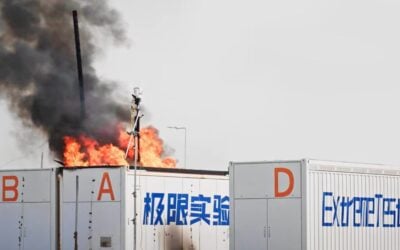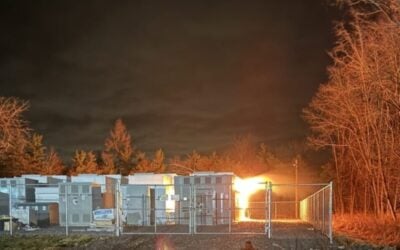
After a power failure and fire at a battery storage system in South Korea was investigated, DNV GL has reported that “current approaches” for monitoring and preventing fires may be inadequate and could result in “small failures” becoming “major issues”.
The insurer of the facility, which experienced a power failure and “major fire”, asked independent expert testing and accreditation group DNV GL to investigate, in what has historically been a strong home country for lithium battery manufacturing, with the likes of Samsung SDI, LG Chem and SK Innovation all headquartered there.
It has also rapidly grown as an end user market for energy storage deployment. However, this has not been without its downsides, with something close to 30 fires reported last year at battery energy storage system (BESS) facilities throughout the country. Investigations into those fires found that defective battery cells were not to blame in any case, but that installation, control and monitoring had not been properly executed, resulting in problems that caused thermal events.
Some have in part attributed this to the speed at which large numbers of installations were given the green light to go ahead. The South Korean government is deliberating on a review and upgrade of safety regulations for energy storage facilities – with initiatives also seen recently in markets including guidance issued by the US National Fire Protection Association (NFPA), New York at state level and Australia.
Try Premium for just $1
- Full premium access for the first month at only $1
- Converts to an annual rate after 30 days unless cancelled
- Cancel anytime during the trial period
Premium Benefits
- Expert industry analysis and interviews
- Digital access to PV Tech Power journal
- Exclusive event discounts
Or get the full Premium subscription right away
Or continue reading this article for free
DNV GL said that it completed an “in-depth” power failure investigation (PFI) at one of those fires. While the group did not go deep into specifics of its report in a release sent to Energy-Storage.news, it said that the investigation “pinpointed the root cause and highlighted weaknesses in current approaches to monitoring and prevention systems that make small failures more likely to become major issues”.
‘Invest more time and attention in adequate monitoring and protection systems’
Indeed, it was a “minor manufacturing glitch” that caused one of those small failures, “coupled with insufficient monitoring and protection systems”, that then meant the failure became a major fire, DNV GL said. It said the insurer was therefore able to make a pay out decision based on evidence from the investigation.
Going forward, DNV GL is also hoping that it can determine the impact of fire on individual systems, in other words, what portion – if any – of a system may remain usable after a fire, how to validate the state of health of a battery after a fire and therefore whether augmentation or replacement of some batteries in a fire-damaged system could be effective, for example.
“Our in-depth and independent analysis of the incident highlighted differences between South Korean and international safety standards that can potentially make small failures more likely,” DNV GL Energy’s executive VP for Asia Pacific, Nicolas Renon, said.
“The South Korean government is already in the process of reviewing it regulations, but we strongly recommend that South Korean energy storage systems project developers invest more time and intention in adequate monitoring and protection systems to stop these small failures becoming major, costly and highly expensive incidents,” Renon said.
In related news, representatives of Arizona Public Service and of Fluence will speak at a keynote panel discussion on fire safety for energy storage at next week’s Energy Storage North America (ESNA) event in California, following a fire at APS’ McMicken battery facility in April of this year.





